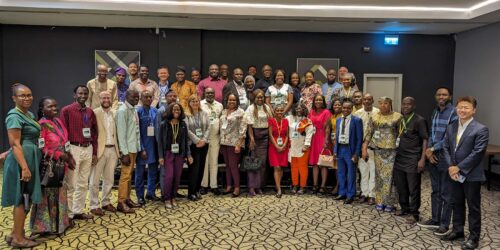
Organic Waste, an Untapped Solution: Waste Authorities in Nigeria Tackle Food Waste as a Climate Solution in Lagos
RMI, in partnership with Nigeria’s National Council on Climate Change, and the International Solid Waste Association, convened Nigerian waste professionals to double-down on reducing methane emissions, and tackling climate change from organic waste. Here’s what they learned.
The race to curb global temperature rise won’t be won without first tackling methane. The super-potent greenhouse gas is responsible for about 30% of global warming since pre-industrial era. Methane also dissipates from our atmosphere much quicker than carbon dioxide, making early action crucial in this decisive decade.
Worldwide, the top methane producers are in agriculture, oil and gas, and a less obvious sector: trash. Waste methane accounts for roughly 20 percent of human-related methane emissions and comes about when organic waste (like food scraps, wood, and paper) decomposes at landfills and dumpsites.
In cities worldwide, the problem with organic waste is particularly acute. In Nigeria, on average 50 percent of municipal waste is organic, with this figure being as high as 80 percent in some cities. But luckily, within that problem lies a big opportunity.
Discussing solutions to organic waste management to reduce methane emissions was the key focus for “Key Strategies for Mitigating Methane Emissions from Municipal Solid Waste” held in Lagos, Nigeria in early October with national, state, and local solid waste authorities and managers from across Nigeria. RMI, in partnership with the National Council on Climate Change (NCCC), provided in-depth training on best practices in solid waste management, organic waste diversion, and biogas development for more than forty solid waste professionals.
“Climate change is a global conundrum, but so much of the action we need to take is local. The importance of states and local governments in addressing climate change cannot be overemphasized,” said Michael Ivenso, Director, Energy, Transportation and Infrastructure for the NCCC. “Waste management and sectoral actions to reduce methane emissions are a low-hanging fruit that can help Nigeria achieve its climate commitments.”
Nigeria is a signatory to the Global Methane Pledge, a commitment launched at COP26 in November 2021 that has now been signed by 150 countries globally, to collectively reduce global methane emissions by at least 30 percent from 2020 levels by 2030. The NCCC is the national designated entity primarily responsible for climate-related policies, coordinating climate action across all sectors, and serves the mandate as Nigeria’s Global Methane Pledge Champion.

Workshop attendees included representatives from the National Environmental Standards and Regulations Enforcement Agency (NESREA), the National Council on Climate Change (NCCC), the Lagos State Ministry of the Environment, Lagos Waste Management Authority (LAWMA), Ogun State Waste Management Authority (OGWAMA), Waste Management Society of Nigeria (WAMASON), and private sector and non-profit organizations focused on organic waste management and biogas development including EarthCare, FABE International Foundation, and Togata Renewable Technologies.
“Waste management in Nigeria is one of the most daunting challenges we face. That’s why collaborating across the sector – as we are doing at this workshop – is critical for managing solid waste, managing methane emissions, protecting our environment, and ensuring we advance our standards and compliance nationwide,” said Martha Kotun, Assistant Director, Lagos Liaison, for in Nigeria.
Public-private partnerships and the important role of the private sector in organic waste management was a key topic of discussion among workshop attendees.
“Partnering with the private sector to scale organics projects, especially biogas development, is critical,” said Babatunde Oladapo Bolarinwa, Director of Planning, Research and Statistics for Ogun State Waste Management Authority.
The workshop was the first major in-country engagement in Nigeria as part of a broader initiative between RMI and the Clean Air Task Force (CATF), who, with funding from the Global Methane Hub (GMH) and Google.org, are gearing up to launch the Waste Methane Assessment Platform (WasteMAP) at COP28.
WasteMAP is a first-of-its-kind accessible online tool that highlights methane emissions, mitigation opportunities, and best practices to reduce solid waste methane emissions, providing a clear pathway for achieving the Global Methane Pledge and national greenhouse gas reduction targets.
“The waste sector is the third largest source of human-driven methane emissions. WasteMAP is designed to provide tools, resources and training for the waste sector to ease the complexity of managing methane emissions from solid waste,” notes Tom Frankiewicz, Principal with RMI’s Climate-Aligned Industries Program.
What sets WasteMAP apart from other platforms is the country engagement efforts that are part of the initiative. The collaborative work within countries includes providing technical assistance with organic waste management and waste methane mitigation, supporting policymakers in setting waste methane reduction targets and pathways, and providing capacity-building trainings in six countries, including Nigeria. While the online platform is set to launch later this year, the in-country work led by RMI and CATF has already begun.
“The WasteMAP workshops are timely with international efforts to manage methane emissions. Organic waste management is a key climate solution and a renewable resource,” said Dr. Jane Gilbert, Chair of International Solid Waste Association’s Working Group on the Biological Treatment of Waste. “With an estimated 1 billion tons of organic waste from municipal sources generated annually worldwide, the abundance of organic waste from homes, markets, restaurants, and factories can be repurposed to create compost as a soil conditioner for agriculture or as a biofuel source. Effective management of organics not only mitigates methane emissions, it also ensures environmentally safe and beneficial waste management practices and has potential economic benefits.”
Stay tuned for the launch of the WasteMAP Platform later this year. Sign up for our newsletter here to be the first to know.
